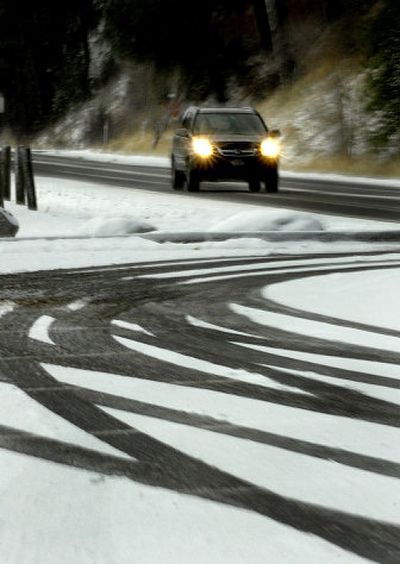Big freeze to test region’s plumbing

The region’s first blast of subzero weather is expected to hit tonight, and Ron Gaunt knows what that means.
By Wednesday morning, some pipes will be frozen. Gaunt, a technical services coordinator for the Spokane Neighborhood Action Programs, advises people on how to weatherize their homes. But a lot of times, his advice comes after the fact.
“We don’t get a lot of calls until they’re already frozen,” Gaunt said Monday.
Now is the time to prevent frozen pipes and other problems that arise with the deep cold. Tonight’s forecast calls for the mercury to drop to minus 7. It’s expected to be the coldest night of the week, though low temperatures should prevail through the weekend.
Heavy snows on Sunday melted a bit, which contributed to icy conditions early Monday.
Police agencies handled hundreds of mostly minor collisions and accidents in the past two days, and some Avista customers were without power at times in Idaho’s Silver Valley – including about 20 homes as of Monday evening, according to Avista.
A lot of winter problems can be avoided with a few simple steps: dress warmly, drive slowly, keep ice off your sidewalk. Still, experts find themselves giving that advice every winter to newcomers, young people and others who haven’t become fully schooled in winter weather.
People interested in ice skating and ice fishing should know that one deep freeze does not make it safe to go out on area lakes. Usually, 6 inches of solid ice is considered the threshold for safety, said Madonna Luers with the Washington Department of Fish and Wildlife.
Winter presents extra problems for the poor and homeless. Robin Waller, communications specialist with SNAP, said some homeless people tend to stay outside until temperatures plummet.
“SNAP is always concerned about families that are on the street. We hope they know us and that they know to call us,” she said. “We just don’t want families to be out there in the cold, especially with young children.”
Here are some tips for staying safe and warm during the cold weather:
“Pipes. Make sure outside hoses are disconnected. Exposed pipes freeze first, so make sure your pipes are covered if you have a crawl space, and make sure foundation vents are closed. You can wrap your pipes in heat tape to help prevent freezing, and leave taps dripping when it gets below freezing. If your pipes freeze, don’t try to thaw them with an open flame – the best method is a hairdryer or calling a plumber.
“Sidewalks. Residents are required to keep them clear of ice and snow. Also, if you’ve got a portable basketball hoop on the street, it’s causing problems for snowplowing crews, and possibly your neighbors.
“Energy. Avista Utilities advises keeping thermostats at 68 or lower, and adding a sweater to stay warm. Add a blanket to your bed and lower the thermostat at night. Close dampers and don’t use the fireplace much – it can actually drain warmth from your home. Don’t use ventilating fans except when needed. Make sure door sweeps are in good shape, or roll a towel and place it at the base of the door. More tips at www.avistautilities.com.
“Pets. Ideally, bring them inside during the cold snap, advises Gail Mackie, executive director of SpokAnimal CARE. Make sure outdoor pets have plenty of water and a place to stay out of the weather.
“Help. People in Spokane who need help – from heating assistance to shelter – can call the Spokane Neighborhood Action Program at (509) 456-7111. Residents of Idaho’s five northern counties can apply for heating assistance through the Community Action Partnership. Appointments are booked through December, with the first openings available in January for assistance through March. Anyone who has received a shut-off notice from their electric or natural gas company, or is nearly out of wood or fuel for heat, can call for an emergency appointment. Contact CAP in Kootenai County at (208) 664-8757 or the office in your county. Assistance in North Idaho for electric, gas, wood, pellets, propane and other heating sources is also available through the federal low-income heat assistance program and locally through Project Share.
“Your car. If maintenance is needed, get it done now. Keep gas and wiper fluid nearly full. Use snow tires if possible, and drive slowly. Keep water and emergency supplies in the car in case you get stuck, including a shovel and bag of sand. For more tips, see the Car Talk Web site on NPR: www.cartalk.com/content/features/WinterDriving/.
“Dress warmly. Experts say layering several pieces of clothing helps keep you warmer, and that covering your head and hands prevents a lot of heat loss.
“Schools. For information on weather-related closures and bus schedules, check Spokane’s Educational Service District Web site, which includes information on districts all over Eastern Washington and parts of North Idaho: www.esd101.net. Listen for broadcast information.